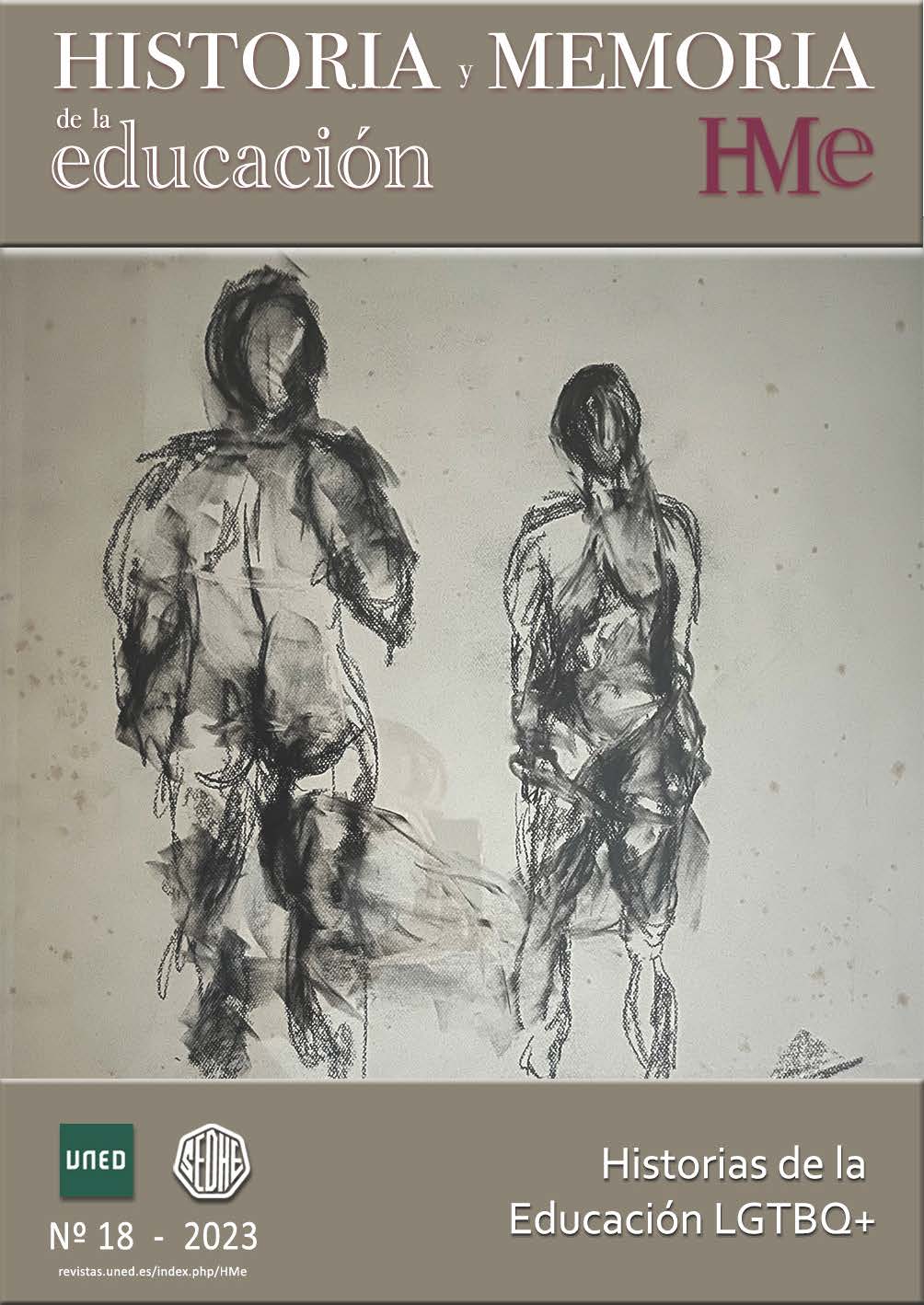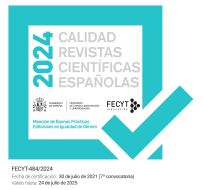Looming deprofessionalization: State interventions into the operation of professional institutions of secondary teacher training in Hungary in the early twenties
DOI:
https://doi.org/10.5944/hme.18.2023.36030Keywords:
professionalization, secondary teacher training, deprofessionalization, state interventionsAbstract
In the paper, the transformation processes of secondary teacher training in Hungary are examined through the investigation of personal and conceptual changes related to two professional institutions, namely the Secondary Teacher Training Institution and the Secondary Teacher Examination Committee in Hungary in the early 1920s.
By employing the method of document analysis of archival sources, substantial amount of primary sources were involved in the research from various archives. Additionally, the secondary literature review is also used as a research method in contextualizing the findings of the analysis. As for the interpretation, notions related to the critical approach of professionalization theories are applied in the paper.
The study gives a brief overview of the development of professional institutions from the mid of the nineteenth century to 1919 in order to provide an insight into some of the main barriers of their development, which expected to be solved by the new regime in Hungary solidified after 1920. The appointment of new leadership in the teacher training institution, the influence on its curriculum, the forced interrogation of the political views of teacher candidates delegated to the teacher examination committee before the state examination and the determination of the reform of the teacher examination regulations all suggest that the state intention of reshaping the teacher training according to circumstances of the new political-social reality after the war resulted in a new relationship between the state and the professional institutions that could lead to deprofessionalization on the long term. This development could be regarded as an unprecedent phenomenon compared to the situation of professionals in other countries in the Central and Eastern European region.
Downloads
References
Babbie, Earl. A társadalomtudományi kutatás gyakorlata [The Practice of Social Research]. Budapest: Balassi Kiadó, 2008.
Betti, Emilio. «A hermeneutika mint a szellemtudományok általános módszertana» [Hermeneutics as a general method of history of ideals]. Athenaeum 1, no. 2 (1992): 3–52.
Bourdoncle, Raymond, and Andre Robert. «Primary and secondary school teachers in France: changes in identities and professionalization». Journal of Education Policy 15, no. 1 (2000): 71–81.
Evetts, Julia. «The sociological analysis of professionalism. Occupational change in the modern world». International Sociology 18, no. 2 (2003): 395–415.
Friedson, Elliot. Professionalism. The third logic. Cambridge: Polity Press, 2001.
Garai, Imre. An elite teacher training institute. The history of Eötvös József Collegium, 1895–1950. Budapest: ELTE Eötvös College, 2019.
Garai, Imre. A középiskolai tanári professzió intézményesülésének folyamatai. A tanárvizsgáló bizottság és a tanárképző intézet működése a pesti tudományegyetemen az 1862–1919 közötti időszakban [Professionalization Processes of the Secondary School Teacher Profession. Operation of the Secondary Teacher Examination Committee and the Teacher Training Institute of the University of Pest, 1862–1919]. Budapest: ELTE Eötvös College, 2022.
Gogu, Emilia, Corina-Cristina Bozdugan and Daniela Nenciu. «Profile of the Romanian Upper Schooling During the Interwar Period». Fiat Iustitia 12, no. 2 (2018): 82–95. https://ideas.repec.org/a/dcu/journl/v12y2018i2p81-95.html
Grimm, Gerald, Beáta Bali, and Veronika Pirka. «Leherbildung in Österreich – Aspekte ihrer Genese von den Anfängen im späten 18. Jahrhundert bis zur Zweiten Republik». In Lehrerbildung in Europa. Geschichte, Struktur und Reform, edited by Németh András and Ehrenhard Skiera, 91–110. Frankfurt am Main – New York: Peter Lang, 2012.
Gyáni, Gábor. «Magyarország társadalomtörténete a Horthy-korban» [The History of the Hunarian Society in the Horthy-era], In Magyarország társadalomtörténete a reformkortól a második világháborúig [The History of the Hungarian Society form the early 19th century to the end of the World War II.]. Edited by Gyáni Gábor and Kövér Gyögy, 187–389. Budapest: Osiris Kiadó, 2006.
Heidenreich, Martin. «Berufskonstruktion und Professionalisierung. Erträgen soziologischen Forschung», In Professionalisierung pädagogischen Berufe im historischen Prozeß. edited by Hans Jürgen Apel, Klaus-Peter Horn, Peter Lundgreen, and Uwe Sandfuchs, 35–58. Bad Heilbrunn: Verlag Julius Klinkhadt, 1999.
Hesse, Hans Albrecht. Berufe im Wandel: ein Beitrag zum Problem der Professionalisierung Stuttgart: Eke, 1968.
Hofstetter, Michael J. The romantic idea of a university. England and Germany, 1770–1850. New York: Palgrave, 2001.
Horlacher, Rebekka. The educated subject and the German concept of Bildung. A Cultural History. New York – London: Routledge, 2016.
Jarausch, Konrad H. The unfree professions. German lawyers, teachers and engineers, 1800–1950. New York – Oxford: Oxford University Press, 1990.
Johnson, Terence. Professions and power. London – New York: MacMillan, 1972.
Kasper, Tomaš, and Dana Kasperová. «Lehrerbildung in der Tsechischen Republik – historische und aktuelle Aspekte». In Lehrerbildung in Europa. Geschichte, Struktur und Reform, edited by Németh, András & Skiera, Ehrenhard, 219–239. Frankfurt am Main – New York: Peter Lang, 2012.
Kéri, Katalin. Bevezetés a neveléstörténeti kutatások módszertanába [Introduction to Methodology of Research Activities in the Discipline of History of Education]. Budapest: Műszaki Könyvkiadó, 2001.
Kiss, Istvánné. Szemelvények a budapesti egyetemi tanárképző intézet gyakorlógimnáziumának jegyzőkönyveiből (1924–1944) [Extrats from the Minutes of the Secondary Practicing School of the Teacher Training Institute of the University of Pest (1924–1944)]. Budapest: Országos Pedagógiai Könyvtár és Múzeum, 1991.
Ladányi, Andor. A középiskolai tanárképzés története [History of the Secondary School Teachers]. Budapest: Új Mandátum Kiadó, 2008.
Larson, Magali Sarfatti. The rise of professionalism. A sociological analysis. Berkely: University of California Press, 1977.
Livezeneau, Irina. Cultural politics in Greater Romania. Regionalism, nation building & ethnic struggle, 1918–1930. Ithaca and London: Cornell University Press, 2000.
Lundgreen, Peter. «Berufskonstruktion und Professionalisierung in historische Perspektive». In Professionalisierung pädagogischen Berufe im historischen Prozeß, edited by Hans Jürgen Apel, Klaus-Peter Horn, Peter Lundgreen & Uwe Sandfuchs, 19–34. Bad Heilbrunn: Verlag Julius Klinkhadt, 1999.
McClelland, Charles E. The German experience of professionalization. Modern learned professions and their organizations from the early nineteenth century to the Hitler era. Cambridge – New York – Sydney: Cambridge University Press, 1991.
Nagy, Péter Tibor. «Az állami befolyás növekedése a magyarországi oktatásban (1867–1945)» [The Increase of the State Influence on the Education in Hungary (1867–1945)] (Academic Doctoral Thesis, Hungarian Academy of Sciences, 2003).
Németh, András. Magyar pedagógusképzés és szakmai tudásformák I. 1775–1945. Nemzeti fejlődési trendek, nemzetközi recepciós hatások [Training of Pedagogues and their Professional Knowlede in Hungary I. 1775–1945. National Trends of Development and Reception of International Tendencies]. Budapest: ELTE Eötvös Kiadó, 2012.
Pál, Hatos. Az elátkozott köztársaság. Az 1918-as összeomlás és az őszirózsás forradalom története [The Sick Republic. The History of the Collapse in 1918 and the Democratic Revolution]. Budapest: Jaffa Kiadó, 2018.
Parsons, Talcott. «The professions and social structure». In Essays in sociological theory, edited by Talcott Parsons, 34–50. London: Macmillan, 1955.
Protner, Edvard, Zdenko Medves, Stefka Batinic, et al. «The Development of Teacher Training in the Stats of Former Yugoslavia». In Lehrerbildung in Europa. Geschichte, Struktur und Reform, edited by András Németh and Ehrenhard Skiera, 237–265. Frankfurt am Main – New York: Peter Lang, 2012.
Pornói, Imre. «Az 1920-as évek Népoktatása és a nyolcosztályos népiskola Magyarországon» [Public Elementary Schooling in the 1920s and the Implementation of 8-grade Elementary Schools in Hungary]. Magyar Pedagógia 95, no. 3–4 (1995): 315–331.
Pukánszky, Béla. «A tanárképző intézet szerepének alakulása a magyarországi tanárképzés történetében» [The Role of the Teacher Training Institute in the History of the Hungarian Teacher Training], Pedagógusképzés 10–11, no. 39–40 (2013): 73–91.
Romsics, Ignác. Magyarország története a XX. században [The History of Hungary in the 20th century]. Budapest: Osiris Kiadó, 2004.
Sandfuchs, Uwe. «Die Lehrerbildung in Deutschland – Geschichte, Struktur und Reform». In Lehrerbildung in Europa. Geschichte, Struktur und Reform, edited by András Németh and Ehrenhard Skiera, 59–72. Frankfurt am Main – New York: Peter Lang, 2012.
Szentpétery, Imre. A királyi magyar Pázmány Péter Tudományegyetem története. Vol. 4. A bölcsészettudományi kar története, 1635–1935 [The History of the Royal Hungarian Péter Pázmány University. Vol. 4. The History of the Philosophy Faculty, 1635–1935]. Budapest: Királyi Magyar Egyetemi Nyomda. 1935.
Veress, Károly. Bevezetés a hermeneutikába [Introduction to Hermeneutics]. Budapest: L’Harmattan – Magyar Daseinanalitikai Egyesület, 2019.
Willing, Carla. «Interpretation and analysis». In The Sage Handbook of Qualitative Data Analysis, edited by Uwe Flick, 136–150. London – Washington: Sage, 2014.
Downloads
Published
How to Cite
Issue
Section
License
Copyright (c) 2023 Historia y Memoria de la Educación

This work is licensed under a Creative Commons Attribution-NonCommercial 4.0 International License.
Authors who publish in Historia y Memoria de la Educación agree to the following terms:
- Authors retain copyright and grant the journal right of first publication with the work simultaneously licensed under a Creative Commons Attribution-NonCommercial 4.0 International that allows others to share the work with an acknowledgement of the work's authorship and initial publication in this journal.
- Authors are able to enter into separate, additional contractual arrangements for the non-exclusive distribution of the journal's published version of the work (e.g., post it to an institutional repository or publish it in a book), with an acknowledgement of its initial publication in this journal.
- Authors are permitted and encouraged to post their work online (e.g., in institutional repositories or on their website) prior to and during the submission process, as it can lead to productive exchanges, as well as earlier and greater citation of published work (See The Effect of Open Access).










